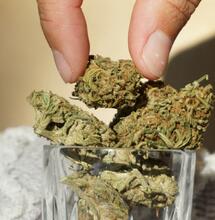Mental Health Above a Bag of Weed — When Pot Doesn't Feel Good, Pause It

While flowers and products derived from the cannabis plant benefit so many people, sometimes they can kick in unwanted effects even among those who use it for medical reasons.
The world is pretty pink with all the promising new research about all things marijuana, and we couldn’t be more glad about this. But does medical or recreational cannabis have any consequences on health, especially mental health?
Even the birds on the trees know that cannabidiol (CBD), an active non-psychoactive ingredient found in marijuana, serves as a treatment for a large spectrum of diseases. Tetrahydrocannabinol (THC), which is the psychoactive ingredient — worshipped among recreational users — is also a subject of rigorous medical research and a curing component for an array of diseases.
While flowers and products derived from the cannabis plant benefit so many people, sometimes they can kick in unwanted effects even among those who use it for medical reasons. While the more significant portion of cannabis users do not experience any undesirable consequences, a small fraction of users do.
May is the month of mental health awareness, so let's see when medical cannabis can help soothe our mental health and when it can disappoint expectations.
Addiction Problems
“Oh, come on, I'm not a junkie addict, I have used this since forever.” Old joke and very accurate! Even though marijuana can’t provoke such an addiction as heavy drugs, we don’t challenge you here. Regular, heavy use might seriously deteriorate your brain and body. The disorder usually happens in two phases: dependence followed by addiction. The dependence primarily refers to an uncomfortable set of withdrawal symptoms.
Addiction on the other hand is more serious and causes an uncontrollable and intense urge to reach out to the vice, despite there may be an imminent danger on the person's life. The numbers aren’t very clear, but the National Institutes on Drug Abuse (NIDA) states that approximately 30% of weed users are very likely to develop a use disorder. Of these, it adds that 9% are at the risk of developing an addiction. And like every indulgence, this can have a lot of health risks: low energy, higher risk of lung cancer, predisposition to mental illnesses like anxiety and depression, or even heart attack.
What was I saying...? Exactly: Memory Loss!
All of a sudden, you are in the middle of the room with a lollipop in your mouth, absolutely unaware of what you were looking at in the first place? This is a common short-lived side effect of marijuana — short-term memory loss, where the brain is fuzzy on things that happened around 20 minutes earlier. But prolonged and extensive use of cannabis could lead to long-term memory issues and, believe it or not, false memory too, according to some recent longitudinal studies.
According to one Dutch study, cannabis use can make people unreliable correspondents in crime scene investigations, and even suggests cannabis consumers should be treated as vulnerable witnesses.
The problem occurs in the brain's hippocampus — the center of memory and emotions — and the autonomic nervous system in the brain interacting with marijuana.
A study published in the Hippocampus Journal informs that persons with a cannabis use disorder (CUD) have significant changes in the shape of the hippocampus. Affected persons may present with episodic memory where they face failure to recall autobiographical events: places, times, associated emotions, and who, what, why, where, and when knowledge.
According to scientists, that is a sign of neurons loss in the hippocampus, which is a natural process but might be accelerated by the regular overuse of pot. In a nutshell, cannabis users are at a higher risk of suffering from false memories, similar to the elderly and psychiatric populations.
Depression
This might come as a surprise because people start with marijuana for the opposite reason: to cheer themselves up and lift their spirits. In fact, CBD is commonly used to treat mental health conditions such as depression or anxiety. However, there are some downsides to this end as well.
According to some novel research, which mainly concerns young adults, the positive benefits of medical marijuana in treating depression are only short-term and might prove damaging in the long run. According to another research run by Canadian, US, and UK scientists, adolescents who use cannabis have a 37% higher risk of developing depression in their early adulthood compared to non-users. So young folks suffering from depression should perhaps try out other ways to meditate and wait until coming of age to enjoy the fruits of the flower.
Schizophrenia
The definition of schizophrenia is a chronic mental illness characterized by hallucinations, delusions, disorganized speech, lack of motivation, difficulties with managing emotions, and problems with thinking and concentration. The direct relation between cannabis and schizophrenia is still debatable and has not been established. The subject is a minefield among many opposed sides. However, there appears to be a general consensus that cannabis could potentially trigger — or, if present, worsen — this vicious disease.
While schizophrenia affects about 1% of people in the United States, it is regarded as a severe brain disorder, which can last a lifetime and has no definitive cure. Persons who have someone in the family diagnosed with a form of schizophrenia should refrain from consuming any cannabis, especially refrain from overconsumption. Building a close circle of friends who are acquainted with the family history at home can help you prevent yourself from succumbing to any use of substances, as innocent as marijuana to as not-so harmless drugs.
Decline in IQ
Yes, some smokers tend to consider themselves smarties. In high mood, they may also propagate some invaluable life lessons although nobody asked them to do so, such as why everyone should try fish sticks to feed their munchies. A study that spanned three decades probed whether indulging in cannabis can lead to a permanent decline in IQ. Like every long-term drug abuse, heavy users are prone to lower their IQ because of Mary Jane, the study suggests.
The study showed that persistent cannabis use caused a notable decline in IQ, and to be more precise, the IQ dropped 6 points for both cannabis-dependent and persistent regular users. Again, the numbers were not in favor when it came to the youngest of users. IQ decline was more expressed among individuals who started using cannabis in their adolescence than early adult years. And more importantly: the cessation of cannabis use did not lead to the restoration of the lost IQ points. You can’t fight with this one. The decline of your IQ is evident after the first joint, and you know it. Hey, but as long as it’s fun, relaxing, and in moderation, it will only make you smarter. Just try not doing it before your final exam.
How to Handle Marijuana Withdrawal Syndrome?
Willpower and determination are the secret weapons to pause or quit anything. Or maybe some meditation and visualization. Just do not pretend that this is going to be a piece of cake. That is if you feel that your time with weed for the moment is up. Every detox process brings a great deal of unpleasant experience and even a dose of pain — psychologically and physically.
The list of marijuana withdrawal symptoms is long and can range from having headaches to suppressed appetite and weight loss to difficulty falling asleep, depression, and anxiety. Fortunately, all those symptoms will pass in a couple of days or weeks, depending on the frequency and amount of prior use of marijuana. The important thing in the period when you decide to pause pot is to refrain from buying any. An occasional puff with friends during this period is okay, but don't do it if it breaks your principle. Help from a qualified professional or a team of friends and people who will show enormous support during the process could significantly ease the process. And just maybe you skip a few parties. Oops.



